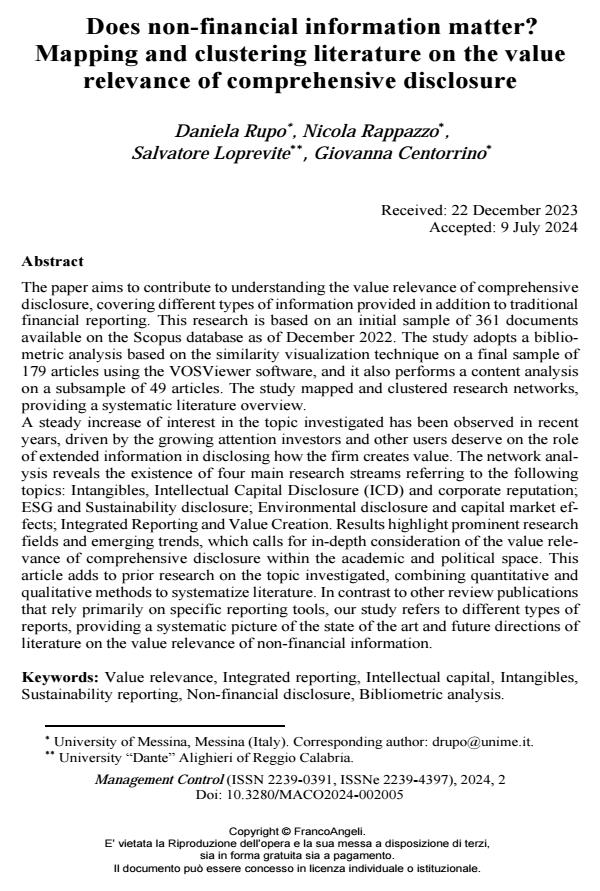Does non-financial information matter? Mapping and clustering literature on the value relevance of comprehensive disclosure
Titolo Rivista MANAGEMENT CONTROL
Autori/Curatori Daniela Rupo, Nicola Rappazzo, Salvatore Loprevite, Giovanna Centorrino
Anno di pubblicazione 2024 Fascicolo 2024/2
Lingua Inglese Numero pagine 26 P. 89-114 Dimensione file 528 KB
DOI 10.3280/MACO2024-002005
Il DOI è il codice a barre della proprietà intellettuale: per saperne di più
clicca qui
Qui sotto puoi vedere in anteprima la prima pagina di questo articolo.
Se questo articolo ti interessa, lo puoi acquistare (e scaricare in formato pdf) seguendo le facili indicazioni per acquistare il download credit. Acquista Download Credits per scaricare questo Articolo in formato PDF

FrancoAngeli è membro della Publishers International Linking Association, Inc (PILA)associazione indipendente e non profit per facilitare (attraverso i servizi tecnologici implementati da CrossRef.org) l’accesso degli studiosi ai contenuti digitali nelle pubblicazioni professionali e scientifiche
The paper aims to contribute to understanding the value relevance of compre-hensive disclosure, covering different types of information provided in addi-tion to traditional financial reporting. This research is based on an initial sam-ple of 361 documents available on the Scopus database as of December 2022. The study adopts a bibliometric analysis based on the similarity visualization technique on a final sample of 179 articles using the VOSViewer software, and it also performs a content analysis on a subsample of 49 articles. The study mapped and clustered research networks, providing a systematic literature overview. A steady increase of interest in the topic investigated has been observed in re-cent years, driven by the growing attention investors and other users deserve on the role of extended information in disclosing how the firm creates value. The network analysis reveals the existence of four main research streams re-ferring to the following topics: Intangibles, Intellectual Capital Disclosure (ICD) and corporate reputation; ESG and Sustainability disclosure; Environ-mental disclosure and capital market effects; Integrated Reporting and Value Creation. Results highlight prominent research fields and emerging trends, which calls for in-depth consideration of the value relevance of comprehen-sive disclosure within the academic and political space. This article adds to prior research on the topic investigated, combining quantitative and qualita-tive methods to systematize literature. In contrast to other review publications that rely primarily on specific reporting tools, our study refers to different types of reports, providing a systematic picture of the state of the art and fu-ture directions of literature on the value relevance of non-financial infor-mation.
Parole chiave:Value relevance, Integrated reporting, Intellectual capital, Intangi-bles, Sustainability reporting, Non-financial disclosure, Bibliometric analysis
Daniela Rupo, Nicola Rappazzo, Salvatore Loprevite, Giovanna Centorrino, Does non-financial information matter? Mapping and clustering literature on the value relevance of comprehensive disclosure in "MANAGEMENT CONTROL" 2/2024, pp 89-114, DOI: 10.3280/MACO2024-002005